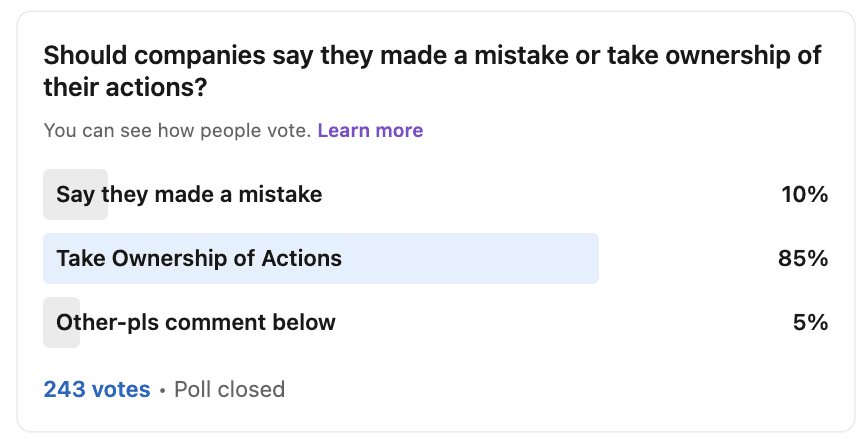
Over the weekend, the Bud Light crisis story continued to fester, after Anheuser-Busch CEO Brendan Whitworth released a statement titled “Our Responsibility to America” on April 14.
Since it still remains a popular topic of conversation within the communication industry, as can be seen through numerous social media posts, we decided to take the temperature of the PRNEWS audience through a LinkedIn poll, to see how PR professionals are viewing the situation.

The poll post prefaced the above question with background surrounding the campaign action and reaction of Bud Light and Anheuser-Busch. The published statement does not directly address the Dylan Mulvaney influencer post or the social media silence that followed, nor does it offer specific apology language, but it includes vague acknowledgement of the situation.
“We never intended to be part of a discussion that divides people. We are in the business of bringing people together over a beer.”
As you can see from the poll results, communicators (and consumers) expect more from brands in this day and age—especially when a brand or its representatives are attacked surrounding a move toward inclusion.
Ten, maybe even five years ago, a company may be expected to release an apology statement, directed toward those offended. Today, particularly since the George Floyd cultural reckoning, it’s become preferred business to promote diversity, equity and inclusion in brand messaging. Consumers expect it, and it is welcomed. So when such a post or content is attacked, a majority of PR professionals see the importance of supporting those decisions and making an impact.
How Bud Got it Wrong
Jenny Wang, SVP, Clyde Group, says yes, in today’s polarized environment it is difficult to make everyone happy, so brands should take the high road.
“Instead of catering to a dwindling base whose views are based on intolerance, understand that companies of the 21st century are responsible for promoting inclusivity, not bigotry—and that the majority of modern customers expect and want this,” Wang says.
Wang calls the response hesitant, tepid and unclear, which she feels just alienates more customers and consumers.
Drew Kerr, brand communications consultant at Four Corners Communications, expands on that thought by explaining the possible alienation of potential partnerships as well.
“You can’t walk into any partnership blind in this political climate, which means you have to be prepared for a possible attack,” Kerr says. “That means diplomatically defending your partners instead of leaving them twisting in the wind. If you can’t do that, why should any partner trust working with you again?”
Look at the Long Term
Unfortunately, nowadays it is normal to anticipate backlash to any campaign, due to the number of outlets and screens supplying content. Not everyone comes from the same background or has the same set of beliefs.
Preparing for backlash is just another part of any crisis communications preparation.
Brands may be anxious to respond after an immediate attack to settle the reputational atmosphere. However, Wang says it’s vital for brands to own their actions, especially when it comes to DEI, for long-term stability.
“I understand stock prices and sales have gone down [for Bud Light] amidst the controversy— and that [Whitworth] was trying to stem the losses—but from a corporate reputation standpoint, do you want to look at the short-term or the long-term?” she asks. “From a long-term perspective, Bud Light could have ultimately enhanced their corporate reputation by leaning into their message of inclusivity and reaching new consumers as a result.”
A crisis plan should include tools for backlash, and Wang says those can include everything from prepared statements from the company and CEO as well as social media messaging. She also notes the importance of message training for executives as well as having allies and third-party validators in place to defend you.
Do Not Go Silent
Bud Light also went silent for almost two weeks on social media, exposing the brand to reputational damage and and an uncontrolled critical narrative. Staying silent during a crisis is never the answer. Michael Grimm, VP at Reputation Partners, says social responses outlining why they launched the campaign and how it defined brand identity and purpose could have helped.
"By going dark, they created a vacuum for the likes of Kid Rock to go viral by shooting Bud Light cases and [catalyzing] the culture war to consume this crisis, and Bud Light/Anheuser Bush with it," Grimm says.
"This is a teaching moment for any brand seeking to take part of cultural hot button issues: if a brand seeks to engage and participate in these topics, they must be prepared to stand tall and answer to the adverse reactions, and not fall into the void allowing for what could be a momentary crisis into a multi-week crisis that affects stock prices and weak CEO statements."
Beware of Pinkwashing
And while it seems like common sense not to participate in inclusive marketing if corporate culture or the brand is not ready to defend it, pinkwashing is still an issue for many. Pinkwashing refers to the practice of attempting to monetarily and reputationally benefit from LGBTQ+ support messaging and marketing, often as a way to distract from alternative agendas or dated social and cultural policies within a company.
“You can, and should, include LGBTQ+ influencers or faces in your marketing, but also expect scrutiny around how you as an organization are actually aligning with these values you're trying to espouse,” Wang says. “For example, how's your LGBTQ+ workforce representation? Are you donating to political candidates who are putting in place harmful anti-LGBTQ+ legislation? Do your LGBTQ+ employees feel supported on a daily basis? That is where the real DEI work is.”
Partnerships and Trust
Obviously, Mulvaney is not the only influencer partnership Bud Light has, so how will this impact the opinion of current and potential influencers looking to work with the brand?
Kerr says this move may tarnish the reputation of Bud Light in this sector of content, because that partnership trust and protection has been squashed.
“The most important aspect of working with any partner, no matter who they are, is to be a believer in who they are,” Kerr says. “You wouldn’t be a partner without that underlying bond.”
And it’s just human nature that not everyone is going to love a brand or promotions, but brands must be ready to defend their actions to protect those trusted partnerships.
“Having naysayers is a mark of authenticity,” Kerr says. “[But] if somebody attacks your partner because of their relationship with you, that is also an attack on you. The same thing with praise.”
Nicole Schuman is senior editor for PRNEWS. Follow her: @buffalogal
